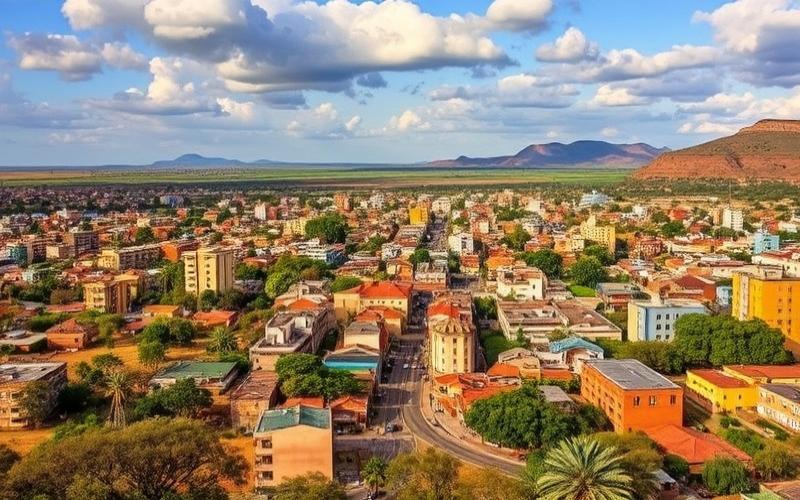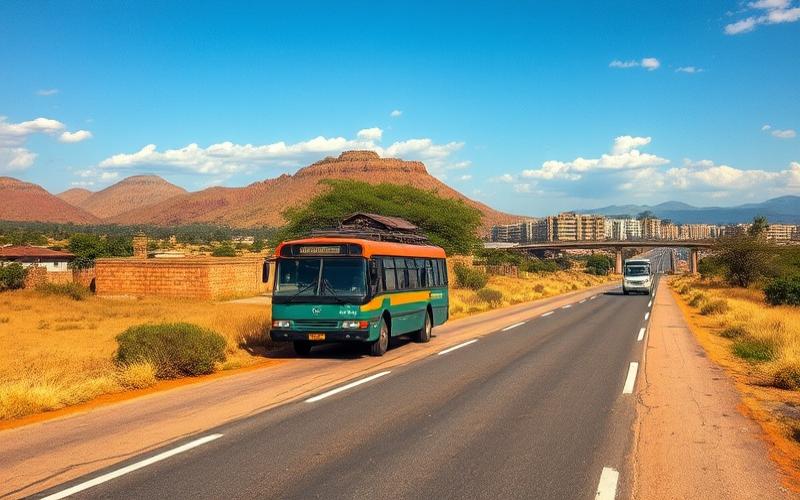
 Published on and written by Cyril Jarnias
Published on and written by Cyril Jarnias
South Africa, with its breathtaking landscapes and rapidly expanding automotive market, has established itself as a favored destination for vehicle imports. To navigate this complex and fascinating market, it’s essential to understand fundamental steps such as customs regulations, compliance with local environmental standards, and selecting a competent logistics provider.
This article explores the essential procedures for bringing your vehicle into South Africa, highlighting practical tips and expert recommendations to ensure a smooth import process.
Understanding Customs Formalities for Vehicle Import to South Africa
Required Documents for Vehicle Import to South Africa
- Certificate of Origin: Certifies the vehicle’s country of manufacture and is essential to prove authenticity and compliance with South African standards.
- Import Permit: Mandatory for all imported vehicles, obtained from the International Trade Administration Commission (ITAC). This permit is nominative, non-transferable, valid only for the current calendar year, and must match the specific vehicle category.
- SABS/NRCS Letter of Authority: Document issued by the South African Bureau of Standards (SABS) or National Regulator for Compulsory Specifications (NRCS) certifying that the vehicle meets local technical requirements for safety and emissions.
- Customs Declaration DAU: Official form to complete during customs clearance; covers details about the imported goods. To be completed with South African customs services after registering your business as an importer.
| Document | Issuing Authority | Purpose |
|---|---|---|
| Certificate of Origin | Manufacturer/Exporter | Prove origin and compliance |
| Import Permit | ITAC | Administrative authorization |
| SABS/NRCS Letter | Standards Bureau | Technical validation |
| DAU Declaration | Customs | Tax/customs registration |
Additional documents depending on status:
- Passport or identification document
- Official foreign registration certificate
- Proof of permanent residence if applicable
Applicable Taxes and Duties
- Customs Duties: Calculated on FOB value typically increased by 10%, according to official rate at time of shipment.
- VAT: Standard rate generally around 14% applied to total declared value + duties.
- Miscellaneous Fees: Fixed charges related to physical inspection by Customs.
Possible Exemption Criteria
Exemptions mainly concern:
- Classic vehicles, vintage cars, or special vehicles (racing, collection)
- Goods under ATA Carnet (temporary admission), temporarily exempt from taxes and VAT if re-exported within a specified period
Certain categories like inherited vehicles or those intended for specific professional use may also qualify for special treatment.
South African Safety & Emissions Standards
Vehicles must imperatively meet local standards:
- Technical compliance certified by SABS/NRCS letter
- Strict adherence to legal thresholds for pollutant emissions
- Active/passive safety validated during inspection
Any non-compliance results in definitive refusal or costly requirement to meet standards.
Role of Customs Brokers & Specialized Logistics
Specialized agents facilitate all administrative steps:
- Preparation of complete documentary dossier
- Submission of official declarations to competent authorities
- Tracking payment of applicable taxes/duties
- Organization of secure international transport/local freight
They are also preferred contacts for any technical questions related to customs clearance or regulatory adaptation.
Indicative Timelines by Stage
- Dossier preparation & import permit acquisition — approximately 2 to 4 weeks
- SABS compliance verification/inspection — approximately 1 week
- Administrative/customs clearance — varies between 5 business days and several weeks depending on dossier complexity
To optimize these timelines:
- Anticipate permit request upon import project confirmation
- Thoroughly verify each document before submission
- Systematically use a licensed local agent with field experience
Manage all administrative procedures rigorously to limit risks of blockage/prolonged transit.
Good to Know:
Vehicles imported to South Africa must have a certificate of origin, import permit, and comply with local safety and emissions standards; using a customs broker is recommended to simplify procedures and optimize timelines. Import taxes and duties may be partially exempt for vehicles meeting certain criteria, remember to check specific regulations before importation.
Traffic Taxes in South Africa: What You Need to Know
Traffic taxes in South Africa are divided into national, provincial, and municipal taxes, each with specific application and collection characteristics.
Main Applicable Taxes
- National Value Added Tax (VAT)
- VAT rate increased to 15.5% on May 1, 2025 and will reach 16% in April 2026.
- Applies to purchase of new or imported vehicles as well as spare parts.
- Transfer Duty
- For transactions involving imported vehicles (particularly during ownership transfer), the zero threshold was raised to ZAR 1.21 million for non-taxed duties; beyond this, progressive rates apply.
- Provincial Taxes
- Some provinces apply registration fees or annual taxes on motor vehicles.
- Municipal Taxes
- Municipalities may impose additional fees related to residential parking or specific permits.
| Tax Type | Authority | Rate/Threshold | Main Application |
|---|---|---|---|
| VAT | National | 15.5% then soon 16% | Purchase/importation |
| Transfer Duty | National | ZAR >1.21M | Imported property transfer |
| Annual Registration | Provincial | Varies by province | Ownership/usage |
| Municipal Taxes | Municipal | Variable | Local parking/permits |
Recent Legislative Changes
- Increase in national VAT rate decided in budget adopted by Parliament to strengthen public funding in a tense economic context.
- Raised non-taxable threshold for transfer duties to alleviate tax burden on certain transfers.
Owner Obligations and Procedure
Mandatory declaration to the South African Revenue Service (SARS) upon vehicle import or transfer; must provide proof of origin and validated customs documents.
Tax payment before final registration: no issuance without prior proof of full payment.
- Declare any imported vehicle within three days of arrival;
- Settle VAT during customs clearance;
- Pay any provincial/municipal duty before local use;
Timelines:
For most procedures:
- Legal deadline: maximum 7 business days after vehicle receipt
- Delay: penalty proportional to amount due + interest calculated per day
Penalties for delay/non-payment:
- Immediate suspension of provisional certificate
- Fixed fine potentially reaching up to 20% of initial amount
- Legal risk if proven fraud
Modern Collection Infrastructure
Collection primarily relies on:
- Electronic e-toll systems at major highway tolls
- SARS digital platforms for instant declaration/payment via Internet Banking
Main urban roads are equipped for automatic camera reading; each passage triggers direct billing to the account linked to registration.
Practical Tips for New Importers:
- Verify all customs documents are compliant before shipping to South Africa
- Create SARS account upon physical receipt to avoid administrative delays
- Use exclusively official SARS/eNatis/e-toll portals – avoid unlicensed intermediaries
- Anticipate tax budget with preliminary simulation including local/provincial duties according to final location
- Stay informed annually about legislative changes published in official Gazette Notice
Strict adherence to declaration deadlines and systematic use of electronic infrastructure are two essential keys to avoid heavy penalties related to recent South African tax regulations.
For any complex questions or special cases (atypical vehicle, particular vintage…), consulting directly with a certified local tax expert is recommended.
Good to Know:
In South Africa, traffic taxes include national, provincial, and municipal contributions that vary by location and vehicle type; a recent legislative amendment requires registration updates within eight weeks of importation, under penalty of financial penalties. To facilitate payment, electronic systems and tolls are implemented, and with each imported vehicle transfer, the owner must imperatively declare and settle taxes through these infrastructures to avoid delays and legal complications.
Driver’s Licenses for Expatriates in South Africa: Practical Guide
Driver’s Licenses for Expatriates in South Africa: Practical Guide
Types of Driver’s Licenses Recognized in South Africa
| License Type | Recognition in South Africa | Specific Conditions |
|---|---|---|
| South African Driver’s License | Standard license, issued locally | Requires passing local exams |
| Foreign Driver’s License | Temporarily accepted if accompanied by official translation or international license | Valid 1 year for temporary residents |
| International License | Recommended for fully legal driving | Accompanied by original national license |
Driver’s License Acquisition Process for Expatriates
For Holders of Foreign License (e.g., French license)
If you possess a valid foreign license and are temporarily residing (less than one year): you can drive in South Africa provided you have an official English translation or international license accompanying the original license.
If you become a permanent resident, you must convert your foreign license to a South African license. This application must be made within one year of obtaining permanent resident status.
Steps to Convert Foreign License to South African License
Visit the Department of Transport in your province of residence.
Complete the dedicated conversion form.
Provide the following documents:
- Passport
- Valid foreign driver’s license
- Proof of permanent residence
- South African identity document (ID book or card)
- Proof of license validity (often an information extract or equivalent document, translated and legalized)
Pass an on-site eye test.
Submit 4 recent identification photos.
The conversion application involves surrendering the foreign license to South African authorities.
Typical Processing Time
After submitting complete dossier and validation, the South African license is generally available within 2 to 3 months. Notification is sent to collect the document.
Theoretical or Practical Exam Requirements
For conversion of a recognized foreign license, no additional theoretical or practical exam is required. Only an eye test is mandatory.
For first-time application (without recognized foreign license), you must:
- Pass a theoretical exam (road rules) to obtain a Learner’s Licence (valid 2 years).
- Then pass a practical driving test at a Driving Licence Testing Centre to obtain the full license.
Associated Costs
| Procedure | Indicative Amount |
|---|---|
| Foreign license conversion | 300 to 400 ZAR (varies by province) |
| Eye test | 50 to 100 ZAR |
| Local license issuance | 250 to 350 ZAR |
| Driving lessons (optional) | 150 to 250 ZAR/hour |
Resources and Local Organizations to Contact
- Department of Transport of relevant province
- Driving Licence Testing Centres (DLTC): for exams and dossier submission
- Consulate of your country of origin: for translations and certifications
- Official list of sworn translators
- Make online appointments or arrive early morning at centers to avoid long queues.
- Prepare all original documents and certified copies.
- Verify validity of each document and need for official translations before any visit.
- Keep all proof of payment and dossier submission.
- If not yet permanent resident, consider obtaining international license before leaving your country of origin.
Important Points to Remember
- Foreign driver’s license alone is insufficient: must be accompanied by official translation or international license.
- Conversion is possible only for permanent residents, within one year of obtaining this status.
- For non-residents or temporary stays, carrying translation or international license while driving is mandatory.
Good to Know:
Any delay in submitting conversion application after obtaining permanent resident status may require retaking all South African exams.
South African license is issued only after eye test and submission of foreign license, which will be retained by local authorities.
Procedure may vary slightly by province: recommended to verify specific modalities with local license issuing center or on official provincial websites.
To convert a foreign license in South Africa, passing a theoretical exam is often necessary; however, holders of international driver’s license can drive temporarily without conversion. Timelines for obtaining South African license vary, but planning at least 3 to 6 months for complete conversion is advised; costs may vary by provinces.
Disclaimer: The information provided on this website is for informational purposes only and does not constitute financial, legal, or professional advice. We encourage you to consult qualified experts before making any investment, real estate, or expatriation decisions. Although we strive to maintain up-to-date and accurate information, we do not guarantee the completeness, accuracy, or timeliness of the proposed content. As investment and expatriation involve risks, we disclaim any liability for potential losses or damages arising from the use of this site. Your use of this site confirms your acceptance of these terms and your understanding of the associated risks.
























































